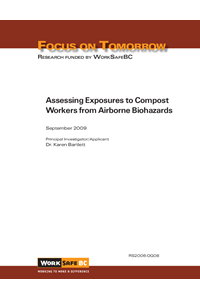Assessing Exposures to Compost Workers from Airborne Biohazards
The purpose of this research was to measure compost workers' exposures to selected biohazards. The study examined different composting technologies, under different environmental conditions, with an aim to uncover ways to best reduce exposure to harmful substances for compost-workers
Compost workers’ exposure to selected airborne biohazards (fungal, bacterial, and other organic matter) that can affect respiratory health were measured at three composting facilities in B.C. The researchers also examined whether concentration levels are associated with other factors, including season, climate, type of composting technology, type of feed-stock (organic matter being composted), job tasks, and engineering controls
The study confirmed that workers at composting facilities are exposed to airborne biohazards, and revealed that working inside air-conditioned cabs significantly reduces exposure levels. Based on the findings, the researchers make recommendations for reducing worker exposures in the composting industry
| Principal Investigator: | Karen Bartlett (UBC) |
| Co-investigators: | James Atwater, Kay Teschke (UBC) |
| Funding Awarded: | $399,743 (2 years) |

